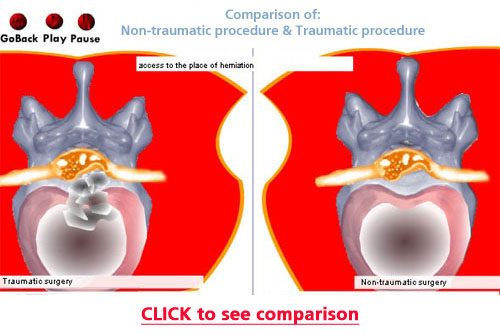Breakthrough Procedure Uses Tiny Scope
POSTED: 2:52 p.m. PST February 20, 2003
UPDATED: 3:32 p.m. PST February 20, 2003
Four out of five Americans suffer low back pain at some point in their lives. When therapy and medicine fail, a new procedure may be the simplest surgical solution yet.
Mitchell Scott's back had been hurting for 20 years. It got really bad last fall after some heavy lifting while gardening. "It started out with a twinge right next to my tailbone and it just progressed and got worse and every day it got a little worse," said Scott. MRIs showed that Scott had two herniated discs. Medicines and physical therapy failed to help, but Scott didn't want major surgery. So he turned to the Internet, where he found Dr. David Ditsworth's Web site, which offered an alternative. Ditsworth calls his approach "small endocscopic discectomy." He simply removes pieces of the herniated discs through a tiny scope. "It looked like a great way to treat a herniated disc," said Scott. "It's a procedure that requires precise planning and mapping to come exactly to the spot that need(s) to be treated in the spine," said Ditsworth. That planning begins with a test called a discogram. After numbing the area, Ditsworth injects dye right into the bad disc. A CAT scan then shows him the exact route he has to follow with the scope to cure the problem. When Scott went into surgery he remained awake as the doctor numbed his back and made a very small incision -- only about two-tenths of an inch. Using the CAT scan as a guide, Ditsworth inserted the scope and a tiny grasper, which he uses to remove disc fragments that are pressing on nerves. It took only about 30 minutes to treat the first disc. The second disc took even less time. With only a bandage covering the incisions, Scott was able to leave the hospital a couple of hours later. After spending the night with his parents in La Crescenta, Scott was ready to head back home to Templeton, in time for his daughter's soccer game. "It'll be hard for her to believe that I had back surgery one day and (came) to her soccer game the next day. I feel great," said Scott. Three weeks after the operation, NBC4 spoke to Scott and he said the pain he's had for 20 years is now gone. This procedure isn't for everyone. Some people with herniated discs may be treated with medicines and therapy. When surgery is necessary, this may be an ideal solution. Many doctors perform similar procedures. You can contact Dr. David Ditsworth by phone at (800) 956-6724Copyright 2003 by NBC4.tv. All rights reserved. This material may not be published, broadcast, rewritten or redistributed.











